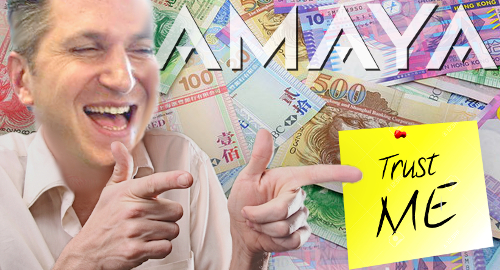 Amaya Gaming’s shares have soared on Friday after former CEO David Baazov (pictured) provided yet another update on his bid to take the company private.
Amaya Gaming’s shares have soared on Friday after former CEO David Baazov (pictured) provided yet another update on his bid to take the company private.
On Friday, Baazov filed papers with the US Securities and Exchange Commission (SEC) detailing the latest financing sources behind his C$24 per share bid to acquire the Toronto- and New York-listed Amaya, the parent company of PokerStars, and take it private.
On November 14, Baazov filed SEC papers claiming that his takeover bid was backed by four investment groups, but one of these firms – Dubai-based KBC Aldini Capital Ltd – later claimed that it had no idea what Baazov was talking about and filed its own SEC paperwork accusing Baazov of fraudulently using KBC’s name.
Baazov subsequently issued a statement admitting that KBC wasn’t involved and that he and his advisors had somehow been hoodwinked by as-yet unidentified parties passing themselves off as KBC reps. That same day, another of Baazov’s four previously identified financers, Hong Kong-based Goldenway Capital, said it was “prepared to increase our commitment” to ensure the Amaya bid’s success.
On Friday, Baazov said he’d received “binding equity commitment letters” worth $3.45b from Goldenway and the Hong Kong-based Head and Shoulders Global Investment Fund. The fourth entity originally cited by Baazov, the formerly British Virgin Island-registered Ferdyne Advisory, went unmentioned in Baazov’s filing, suggesting that the little-known firm’s involvement was as illusory as KBC’s.
Head and Shoulders chairman Stanley Choi told Bloomberg that he was “not at all” concerned by the confusion surrounding Baazov’s bid, a far different tone from Choi’s comments of a few days ago that there was “a lot of uncertainty right now” as to the bid’s prospects.
Choi is a well-known poker player who collected $6.5m for winning the 2012 Macau High Stakes Challenge. Choi is also an investor in Mediarex Sports and Entertainment, the Alex Dreyfus-led firm behind the Global Poker League.
Amaya investors welcomed Friday’s filing, sending the company’s share price up 7.5% by midday trading. The optimism wasn’t shared by former Amaya investor David Taylor, president of Taylor Asset Management. On Thursday, Taylor told Canada’s BNN that the stock “scared the living daylights out of me now” because there were “some things when I owned the stock that made me uneasy … just some of the actions by the CEO.”
DREYFUS: ASIAN INVESTORS SEE GREAT POTENTIAL IN GAMING INDUSTRY
Dreyfus told CalvinAyre.com that while he “helped to connect some dots” between Head & Shoulders and Baazov, it was his understanding that the firm had been “approached earlier this year by several bankers” regarding a potential investment. Dreyfus has no connection with Goldenway so he couldn’t speak as to the genesis of its involvement. Dreyfus also said he holds no Amaya shares, nor is he part of the consortium backing Baazov.
It’s Dreyfus’ understanding that the two HK firms “have worked since almost nine months on that bid.” Dreyfus views the fact that neither company appears overly spooked by the KBC fiasco demonstrates “a real commitment” on behalf of the investors. Dreyfus singled out H&S’ Choi in particular as “a real believer in the potential of the poker industry.”
Dreyfus, who now spends one-third of his time in Asia, says Chinese and Hong Kong investors are increasingly “driven by the potential of the gaming and entertainment industry.” Dreyfus cited Chinese firms’ recent acquisitions of the World Poker Tour and Caesars Interactive Entertainment’s social gaming division Playtika as examples of this rising interest.
Finally, Dreyfus weighed in on what PokerStars’ proposed exit from the public markets means for the brand. “While the corporate angle of the story is important – and there is the lot of noise around it – the real angle for me is how it will impact the poker industry and how it will create great opportunities.”
“PokerStars privatized, with a management focus on the growth of the game and not distracted by the public-listed needs, is a major step for a company that has more than 70% of market share. I guess the company could gain in flexibility for its business development strategy, in either new territories or product innovation.”





